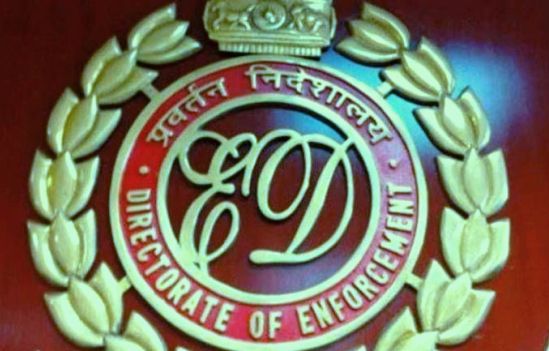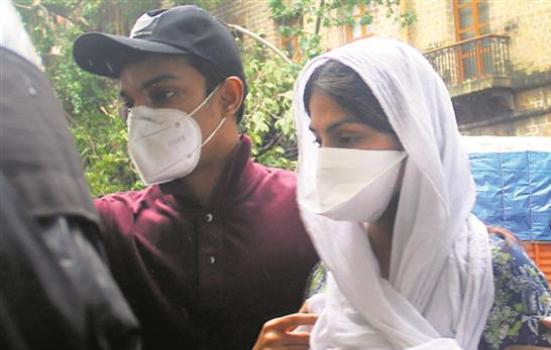By Kusumkali Mitra-
The current sensational case of the late actor Sushant Singh Rajput has shaken the country to its core. The ED is investigating the current case from the point of view of the alleged money laundering case against Rhea Chakraborty. Currently, the ED is taking statements of the relatives and the potential people who could be potentially involved in the case of the late actor to prove the case of money laundering against Ms. Chakraborty.
With this note, let us delve into what is ED.
INTRODUCTION
The Directorate of Enforcement (ED) is a law implementation office and financial intelligence agency responsible for upholding monetary laws and battling financial crimes in India.

The Directorate of Enforcement was built up in the year 1956 with its Headquarters at New Delhi. It is answerable for requirement of the Foreign Exchange Management Act, 1999 (FEMA) and certain provisions under the Prevention of Money Laundering Act. Work identifying with examination and indictment of cases under the PML has been endowed to Enforcement Directorate. The Directorate is under the authoritative control of Department of Revenue for operational purposes; the policy sphere of the FEMA, its enactment and its changes falls inside the ambit of the Department of Economic Affairs. Policy issues relating to PML Act, be that as it may, are the duty of the Department of Revenue. Before FEMA came into force, i.e. on 1 June 2000, the Directorate implemented guidelines under the Foreign Exchange Regulation Act, 1973.
ORGANIZATIONAL SETUP
Shri Sudhir Nath, an official of the position of Additional Special is the Director. There are two Special Directors at Headquarters and one Special Director at Mumbai. The Directorate has 10 Zonal offices each one of which is headed by a Deputy Director and 11 sub Zonal Offices each one of which is headed by an Assistant Directors.
Zonal offices are in various cities like Mumbai, Delhi, Chennai, Kolkata, Chandigarh, Lucknow, Cochin, Ahmedabad, Bangalore and Hyderabad. Sub Zonal offices are located at Jaipur, Jalandhar, Srinagar, Varanasi, Guwahati, Calicut, Indore, Nagpur, Patna, Bhubaneshwar and Madurai.
POWER
- To collect, develop and disseminate intelligence identifying with infringement of FEMA, 1999, the insight inputs are gotten from different sources, for example, Central and State Intelligence agencies, complaints and so forth.
- To examine associated infringement with the provisions of the FEMA, 1999 identifying with exercises, for example, “hawala” unfamiliar foreign exchange racketeering, non-acknowledgment of export fare, non-repatriation of foreign trade and different types of infringement under FEMA, 1999.
- To adjudicate instances of infringement of the erstwhile FERA, 1973 and FEMA, 1999.
- To inflict punishments forced on finish of adjudication procedures.
- To process and suggest cases for preventive confinement under the Conservation of Foreign Exchange and Prevention of Smuggling Activities Act (COFEPOSA).
- To undertake survey, search, seizure, capture, prosecution action and so on against accused party of PMLA offence.
- To provide for legal help to or from contracting states in regard of confiscation or appropriation of proceeds of wrongdoing just as in regard of transfer of accused person under PMLA.
JURISDICTION
The ED has pecuniary jurisdiction. Prevention of Money Laundering Act, 2002 vests with ED the power to investigate cases related to money laundering.
STATUTE
The Prevention of Money Laundering Act (PMLA), 2002 was instituted in January, 2003. The Act alongside the Rules encircled thereunder came into force from 1st July, 2005. Sec. 3 of PMLA characterizes offense of money laundering as whosoever r directly or indirectly attempts to indulge or knowingly assists or knowingly is a party or is actually involved in any process or activity connected with the proceeds of crime and projecting it as untainted property shall be guilty of offence of money-laundering. It recommends obligation of banking organizations, monetary institutions and intermediaries for check and upkeep of records of the identity of every one of its customers and furthermore every such exchanges in endorsed structure to the Financial Intelligence Unit-India (FIU-IND). It enables the Director of FIU-IND to force fine on banking organization, financial institutes or delegate on the off chance that they or any of its officials fails to follow the arrangements of the Act.
PMLA empowers certain officers of the Directorate of Enforcement to carry out investigations in cases including offense of money laundering and furthermore to append the property associated with the same. PMLA visualizes setting up of an Adjudicating Authority to practice jurisdiction, power and authority given to affirm attachment or order seizure of joined properties. It additionally visualizes setting up of an Appellate Tribunal to hear advances against the request for the Adjudicating Authority and the authorities like Director FIU-IND.
PMLA visualizes assignment of at least one Court of Session as Special Court or Special Courts to attempt the offenses punishable under PMLA. PMLA permits Central Government to go into a concurrence with Government of any nation outside India for implementing the provisions of the PMLA, trade of data for the anticipation of any offense under PMLA or under the comparing law in power in that nation or investigation of cases identifying with any offense under PMLA.
The other acts which come under the purview of ED are:
- Narcotic-Drugs and Psychotropic Substances Act 1985
- CBDT (Chairman & Member ) Recruitment (Amendment ) Rules 2011
- INCOME TAX Act & Rules-2011
- Benami Transactions (Prohibition) Act 1988
- Customs Act,1962
SPECIAL COURTS
For the trial of an offense culpable under section 4 of PMLA, the Central Government (in consultation with the Chief Justice of the High Court), designates at least one Sessions Court as Special Court(s). The court is additionally called “PMLA Court”. Any appeal against any order passed by PMLA court can legitimately be recorded in the High Court for that locale.
APPELLATE TRIBUNAL
Under Section 25 of the Prevention of Money-laundering Act, 2002, the Central Government has established an Appellate Tribunal. Section 28(4) of the PMLA provides that “the Chairperson or a Member holding a post as such in any other Tribunal, established under any law for the time being in force, in addition to his being the Chairperson or a member of that Tribunal, may be appointed as the Chairperson or a Member, as the case may be, of the Appellate Tribunal under this Act.”
NOTABLE CASES OF ED
Besides the current ongoing case of Sushant Sigh Rajput, there are many other landmark cases.
Some of the notable cases of ED are:
Augusta Wetland Chopper case– Additionally alluded to as the AugustaWestland VVIP chopper deal, the Indian helicopter bribery scandal by Congress led UPA Government alludes to a multimillion-dollar corruption case in India, wherein cash was paid to middlemen and Indian officials in 2006 and 2007 to buy helicopters for higher level politicians. According to the CBI, this added up to ₹2.5 billion (US$35 million), moved through bank accounts in the UK and UAE.
It became visible in mid 2013, when an Indian national parliamentary investigation started into claims of bribery and corruption including several senior authorities and a helicopter producer AgustaWestland encompassing the acquisition of another armada of helicopters. A few Indian Congress lawmakers and military authorities were accused of taking bribes from AgustaWestland so as to win the ₹36 billion (US$500 million) contract for the supply of 12 Agusta Westland AW101 helicopters; these helicopters are planned to perform VVIP obligations for the President of India and other significant state authorities.
Hence, ED took over the investigation and looked into the aspect of bribery and corruption.
PNB Fraud case– The Punjab National Bank Fraud Case identifies with fraudulent letter of undertaking worth ₹11,356.84 crore (US$1.4 billion) given by the Punjab National Bank. The misrepresentation was supposedly composed by diamond baron Nirav Modi. Nirav, his wife Ami Modi, brother Nishal Modi and uncle Mehul Choksi, all accomplices of the organizations, M/s Diamond R US, M/s Solar Exports and M/s Stellar Diamonds; alongside PNB authorities and workers, and heads of Nirav Modi and Mehul Choksi’s organizations have all been named in a chargesheet by the CBI. Nirav Modi and his family departed suddenly in mid 2018 to UK, days before the news of the scam broke in India.
The Enforcement Directorate has attached assets of the accused and is looking to prompt confiscation under the Fugitive Economic Offenders Ordinance.
Vijay Mallya bank loan default-Vijay Mallya was a liqor baron and also had airlines business. He wanted to extend his business. He sold an organization shaped by his father to support his airlines organization.
Vijay Mallya’s Kingfisher became India’s no.1 domestic aircraft company. Because of certain limitations, the Indian Government didn’t permit Kingfisher to fly international flights. To fly international flights he utilized United Spirits or United Breweries to purchase Deccan Air which was a loss making organization and merged it with Kingfisher Airlines however it couldn’t make the profits and was in substantial loss.
To maintain this business he persistently took loans from banks. He took loans of Rs.9000 crores from 17 banks. In spite of the fact that SBI had proclaimed him as bankrupt different banks continued lending him loans since he was an individual from Rajya Sabha and a few parties supported him. His organization Kingfisher likewise – held service tax of travelers, PF, Income Tax of Employees, yet didn’t submit to the PF or IT specialists.
The organization likewise didn’t pay the compensation of its workers or came up short on money. In 2012 the organization closed down. Vijay Mallya had a loan of Rs.9000crore from various banks and he denied to pay this loan and fled to UK. That’s where the ED came into picture. It played a huge role in investigating the money laundering case against him.
There are many other notable cases like 2G Spectrum case, Rose Valley Chitfund, so on and so forth.
DIFFERENCE BETWEEN ED AND CBI
The prime goal of the Enforcement Directorate is the enforcement of two key Acts of the Government of India to be specific, the Foreign Exchange Management Act 1999 (FEMA) and the Prevention of Money Laundering Act 2002 (PMLA). The ED’s (Enforcement is fundamentally connected to checking money laundering in India.
Though the Central Bureau of Investigation (CBI) is the preeminent analytical investigating office in India, it assumes an importance in public life and guarantees the strength of the national economy. Notwithstanding, CBI has jurisdiction over not only financial cases but also in other cases as well.
CONCLUSION
The term ‘Enforcement Directorate’ is generally looked for after in Indian political issues. There have been many instances where ED had to investigate a case and there are such instances as well where the ED has been successful in stopping a possible financial crime.
The ED till date has done commendable job in the sphere of white collar crimes in India and it continues to do so even today.

